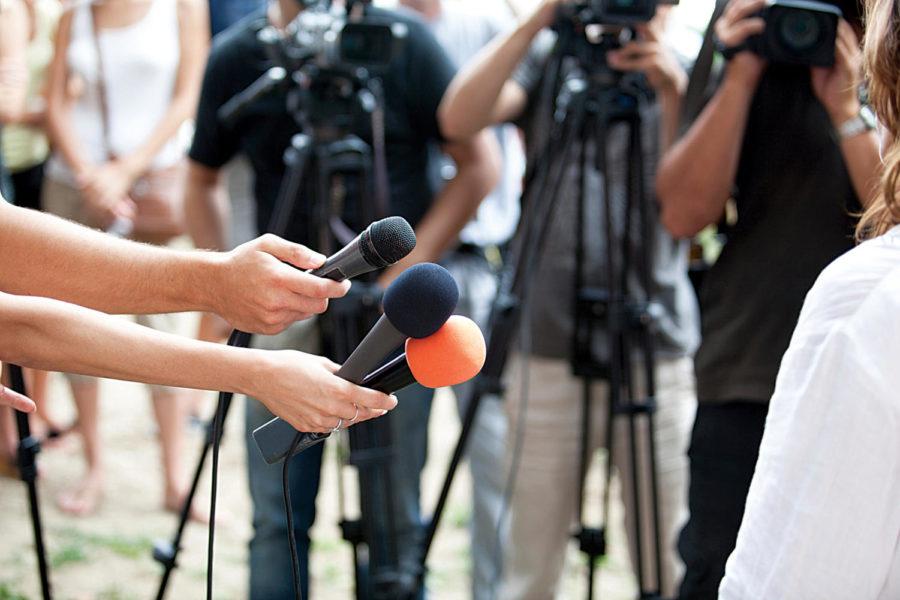Diwate: Poor journalism affects public policy
Columnist Varad Diwate believes it is important to question the factuality of media stories which are presented as truth.
March 28, 2013
“Threats and Responses: The Iraqis; U.S. says Hussein Intensifies Quest for A-Bomb Parts” and “Illicit Arms Kept Till Eve of War, an Iraqi Scientist Is Said to Assert.”
These were the headlines in the New York Times before the Iraq War. As it would turn out later, false reports would go on record in U.S. journalism. The so-called “bad intelligence” and “shoddy reporting” had a heavy price: more than $2 trillion, loss of nearly 4,500 troops, an estimated 1 million Iraqi casualties, human rights abuses and possibly an after-effect: children born with birth defects.
Today, interestingly, all media commentary on a decade of the fight has been focused on impacts of the war and how it was a terrible mistake. There is not much talk about the media’s complicity in being involved with the war. In hindsight, the flimsy evidence, false news reports and propaganda-level media coverage seem to form a coherent whole. The Iraq War wouldn’t be possible without the media and, eventually, the public support.
So, how did unchecked facts go through in a country with a vibrant media? Bill Moyer’s PBS episode “Buying the War” chronicles how the corporate media became reduced to a mouthpiece of the government. The run-up to the war, which should have been the most crucial and tough phase for the Bush administration, turned out to be a cakewalk owing to low-ball questions by the press.
The turn of events leading to the Iraq War now seems to be a cruel joke. The 9/11 link with Saddam Hussein propaganda was tactfully executed. It was so successful that a majority of people supported the war right after its inception. In fact, a September 2003 USA Today report states, “Nearly seven in 10 Americans believe it is likely that ousted Iraqi leader Saddam Hussein was personally involved in the Sept. 11 attacks.” Also, it was soon an accepted reality that intelligence agencies had a consensus and Iraq indeed possessed weapons of mass destruction.
The media and the Bush Administration seemed to agree on everything about Iraq. The “liberal” media had essentially turned out to be in support of the war. Alternative media and ironically satirical shows were among those who questioned or lampooned the official versions. Amy Goodman of Democracy Now calls the media coverage during this period ”beating the drums for war.” Large anti-war protests throughout the world were given minimal coverage.
The actual coverage of the war was no better than the run-up in terms of neutrality. As Moyer points out that civilian casualties were initially reported with horrific, real footage but were eventually found to be “anti-American” for advertisers and viewers. Internal memos in news organizations eventually directed journalists to tone down the negative coverage of the war. Embedded journalists or journalists hosted by the military personnel during the war downplayed the gruesomeness to make it suitable for the audience, including the “patriot police.”
It was also not the best period to find diversity of opinion about the war. Even the now-liberal MSNBC was also one of the channels to cheer for the war. Phil Donahue was fired from his show on MSNBC for giving voice to anti-war activists even before the war began. The whole effort to shut out opposing views now simply seems to be a way to bring together the war chorus.
The war was not only an administrative disaster but also a major media failure. Now, after a decade, everyone seems to be hitting on the right questions. Why did no one fact-check the administrative versions of the war? Who were the sources for front-page stories? Why was there so much of a push to begin the war?
A telling example in which the establishment and the press worked together for possibly a mutually beneficial relationship was the aluminium tubes case. New York Times reporter Judith Miller reported about aluminium tubes being used for nuclear weapons in Iraq. The same day, Vice President Dick Cheney on “Meet the Press” attributed his theory about Saddam Hussein and weapons of mass destruction to the New York Times story. This “scoop” was apparently leaked by unnamed administration officials.
Still, the media frenzy could not persuade some skeptics. Christiane Amanpour had on her show, CNN International, two journalists who got it right. Warren Strobel and Jonathan Landay of McClatchy newspapers consistently fact-checked and dug deeper into the official statements about Iraq. The duo wrote some stories contradicting these claims. They said, “Every time we wrote something, the White House said nothing as it would be the best advertising for our stories.” However, given the reach of their group’s newspapers, the stories did not prove to be as influential.
The Iraq War is probably going to remain the best example of how effectively media spin can influence public policy. This is something that should prompt us to question and critically examine “factual” coverage of the media.
Varad Diwate is a freshman in journalism from Nashik, India.







